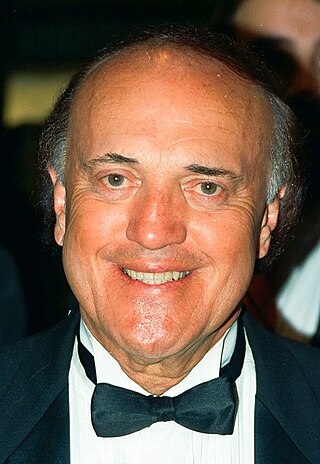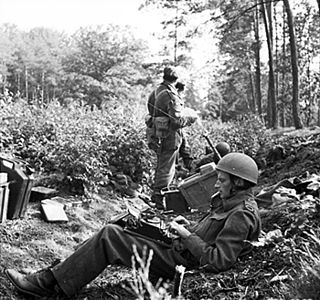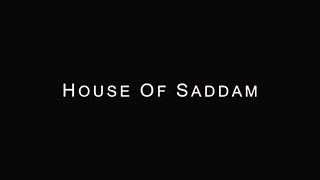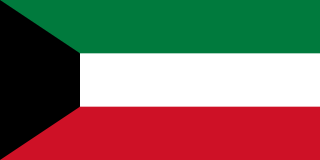Related Research Articles

The Gulf War was an armed conflict between Iraq and a 42-country coalition led by the United States. The coalition's efforts against Iraq were carried out in two key phases: Operation Desert Shield, which marked the military buildup from August 1990 to January 1991; and Operation Desert Storm, which began with the aerial bombing campaign against Iraq on 17 January 1991 and came to a close with the American-led liberation of Kuwait on 28 February 1991.

The Iraqi no-fly zones conflict was a low-level conflict in the two no-fly zones (NFZs) in Iraq that were proclaimed by the United States, United Kingdom, and France after the Gulf War of 1991. The United States stated that the NFZs were intended to protect the ethnic Kurdish minority in northern Iraq and Shiite Muslims in the south. Iraqi aircraft were forbidden from flying inside the zones. The policy was enforced by the United States and the United Kingdom until 2003, when it was rendered obsolete by the 2003 invasion of Iraq. French aircraft patrols also participated until France withdrew in 1996.

Peter Gregg Arnett is a New Zealand-born American journalist. He is known for his coverage of the Vietnam War and the Gulf War. He was awarded the 1966 Pulitzer Prize in International Reporting for his work in Vietnam from 1962 to 1965, mostly reporting for the Associated Press.

The United States Central Command is one of the eleven unified combatant commands of the U.S. Department of Defense. It was established in 1983, taking over the previous responsibilities of the Rapid Deployment Joint Task Force (RDJTF).

Herbert Norman Schwarzkopf Jr. was a United States Army general. While serving as the commander of United States Central Command, he led all coalition forces in the Gulf War against Ba'athist Iraq.
This is a list of aviation-related events from 1991.

Kenneth Michael Pollack is an American former CIA intelligence analyst and expert on Middle East politics and military affairs. He has served on the National Security Council staff and has written several articles and books on international relations. Currently, he is a resident scholar at the American Enterprise Institute, "where he works on Middle Eastern political-military affairs, focusing in particular on Iran, Iraq, Saudi Arabia, and the Gulf countries. Before that he was Senior Fellow at the Saban Center for Middle East Policy at the Brookings Institution and a senior advisor at Albright Stonebridge Group, a global business strategy firm.

A war correspondent is a journalist who covers stories first-hand from a war zone.

Lesley Rene Stahl is an American television journalist. She has spent most of her career with CBS News, where she began as a producer in 1971. Since 1991, she has reported for CBS's 60 Minutes. She is known for her news and television investigations and award-winning foreign reporting. For her body of work she has earned various journalism awards including a Lifetime Achievement News and Documentary Emmy Award in 2003 for overall excellence in reporting.
On 6 August 1990, four days after the Iraqi invasion of Kuwait, the United Nations Security Council (UNSC) placed a comprehensive embargo on Iraq. The sanctions stayed largely in force until 22 May 2003, and persisted in part, including reparations to Kuwait. The original stated purposes of the sanctions were to compel Iraq to withdraw from Kuwait, to pay reparations, and to disclose and eliminate any weapons of mass destruction (WMD).
The Iraqi Armed Forces are the military forces of the Republic of Iraq. They consist of the Iraqi Army, the Iraqi Air Force, and the Iraqi Navy. Along with these three primary service branches, there exists the Iraqi Counter Terrorism Service and the Popular Mobilization Forces. The President of Iraq acts as the supreme commander as outlined by the constitution.

Operation Friction was a Canadian military operation that saw the contribution of 4,500 Canadian Forces personnel to the 1991 Gulf War. The larger US components were Operation Desert Shield and Operation Desert Storm.

House of Saddam is a 2008 British docudrama television miniseries that charted the rise and fall of Saddam Hussein. A co-production between BBC Television and HBO Films, the series was first broadcast on BBC Two in four parts between 30 July and 20 August 2008.

The Iraqi Kurdish Civil War was a civil war that took place between rival Kurdish factions in Iraqi Kurdistan during the mid-1990s, mostly between the Patriotic Union of Kurdistan and the Kurdistan Democratic Party. Over the course of the conflict, Kurdish factions from Iran and Turkey, as well as Iranian, Iraqi and Turkish forces, were drawn into the fighting, with additional involvement from American forces. Between 35,000 and 40,000 fighters and civilians were killed.

Iraqi–Italian relations are the interstate ties relations between Iraq and Italy. Iraq has an embassy in Rome and Italy had an embassy in Baghdad and a consulate-general in Basra.
During the 1991 Gulf War and subsequent operations in no-fly zones over Iraq, Coalition air forces faced the Iraqi Air Force (IQAF), the fourth largest air force in the world at the time. In the opening days of the war, many air-to-air engagements occurred, between Iraqi interceptors and a variety of different Coalition aircraft.

The Republic of Kuwait was a short-lived and self-styled republic formed in the aftermath of the invasion of Kuwait by Ba'athist Iraq during the early stages of the Gulf War. During the invasion, the Iraqi Revolutionary Command Council stated that it had sent troops into the State of Kuwait to assist an internal coup d'état initiated by "Kuwaiti revolutionaries." A Provisional Government of Free Kuwait was set up on 4 August 1990 by the Iraqi authorities under the leadership of nine allegedly-Kuwaiti military officers led by Alaa Hussein Ali, who was given the posts of prime minister, commander-in-chief, minister of defense and minister of the interior.

Desert Storm trading cards are sets of trading cards that feature people and equipment involved in the Persian Gulf War. The cards were published in the United States by various companies and the size of sets varied great in between companies. The cards were claimed to be educational, with proceeds of the sales benefiting the children of Persian Gulf War veterans, and were produced at a time when the trading card industry was expanding its range well outside of the traditional sports figures. These sets were fairly popular in 1991 and each box used by retailers included 36 Packs.
The Persian Gulf War, codenamed Operation Desert Storm and commonly referred to as the Gulf War, was a war waged by a United Nations-authorized coalition force from 34 nations led by the United States against Iraq in response to Iraq's invasion and annexation of Kuwait. Media coverage of the Gulf War was significant for many reasons including CNN's live reporting from a Baghdad hotel, alternative and international coverage, and the use of images.

The Desert Shield and Desert Storm Memorial is under planning to be constructed in Washington, D.C. near the Lincoln Memorial. It will honor members of the armed forces who participated in Operation Desert Storm or Operation Desert Shield.
References
- ↑ Devine, Jeremy M. (1999). Vietnam at 24 Frames a Second: A Critical and Thematic Analysis of Over 400 Films about the Vietnam War. University of Texas Press. ISBN 978-0-292-71601-8.
- ↑ Stahl, Roger (2009-12-04). Militainment, Inc.: War, Media, and Popular Culture. Routledge. ISBN 978-1-135-83750-1.
- 1 2 Sturken, Marita (1997-02-28). Tangled Memories: The Vietnam War, the AIDS Epidemic, and the Politics of Remembering. University of California Press. ISBN 978-0-520-91812-2.
- ↑ Smith, Jeffery A. (1999-02-25). War and Press Freedom: The Problem of Prerogative Power. Oxford University Press. ISBN 978-0-19-535674-8.
- ↑ "The Heroes of Desert Storm". TVGuide.com. Retrieved 2023-12-30.
- ↑ Prouty (1994). Variety TV REV 1991-92 17. Taylor & Francis. ISBN 978-0-8240-3796-3.
- ↑ Stahl, Roger (2018-06-21). Through the Crosshairs: War, Visual Culture, and the Weaponized Gaze. Rutgers University Press. ISBN 978-0-8135-8528-4.
- ↑ Schwartz, Hillel (1996-11-01). The Culture of the Copy: Striking Likenesses, Unreasonable Facsimiles. Princeton University Press. ISBN 978-1-935408-51-2.
- ↑ Goodman, Walter (1991-10-07). "Critic's Notebook; Appropriating History to Serve Politics on TV". The New York Times. ISSN 0362-4331 . Retrieved 2023-12-30.
- ↑ Mueller, John (1994-06-15). Policy and Opinion in the Gulf War. University of Chicago Press. ISBN 978-0-226-54565-3.
- ↑ Rosenberg, Howard (1991-10-04). "Patriotic Celebration Overwhelms 'Heroes'". Los Angeles Times. Retrieved 2023-12-30.